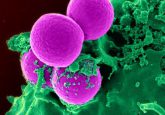Personalized paclitaxel: chemotherapy side effects associated with rare gene variants

Paclitaxel has demonstrated good efficiency as a chemotherapeutic agent in the treatment of solid tumors, including those of the breast, ovaries and lung. However, use of paclitaxel is frequently associated with peripheral neuropathies, symptoms of which include pain and tingling in the extremities, cramping, muscular weakness and difficulty walking. In severe cases the symptoms of peripheral neuropathies can require dosage reduction and even discontinuation of treatment.
At present, a patient’s risk of developing peripheral neuropathy from paclitaxel cannot be determined. Studies to date have suggested the existence of genetic variants that could explain the increased susceptibility of certain patients to this disorder, but none have yet been used as clinical predictive markers.
Researchers from the Spanish National Cancer Research Center (Spain), in collaboration with the Karolinska Institutet (Sweden), have now discovered the first genetic marker associated with severe neurological toxicity.
The study involved sequencing the complete exome of eight Spanish patients with breast cancer who had experienced extreme neuropathies following treatment with paclitaxel. Through this initial phase, genetic variants associated with loss of hepatic CYP3A4 enzyme function were discovered.
“Given these results, we genetically analyzed an independent population of 228 Spanish patients treated with the same drug, in search of these variants. The study confirmed their presence in the patients that experienced the greatest toxicity,” explained lead investigator Cristina Rodríguez-Antona (Spanish National Cancer Research Center).
The findings could prove valuable in clinical practice, potentially allowing the evaluation of treatment risks on an individualized basis, thereby improving quality of life for patients with these variants. The CYP3A4 enzyme is involved in the metabolism of more than 50% of drugs currently used in the clinic, suggesting these findings may be of significance for individualizing a number of treatment regimens.
The study authors highlighted the potential importance of this work for Spanish populations in particular, stating: “Even though these variants are rare or not frequent in the population, their frequency is greater in Spain than in other countries.”
The team summarized: “Our research shows that the recently developed whole-exome sequencing technologies may be useful for identifying genetic markers that predict drug-related adverse effects.”
Sources: Appellaniz-Ruiz M, Le MY, Sanchez L, Gutierrez-Gutierres G et al. Whole-exome sequencing reveals defective CYP3A4 variants predictive of paclitaxel dose-limiting neuropathy. Clin Cancer Res. 21: 322 (2015); Spanish National Cancer Research Centre press release



